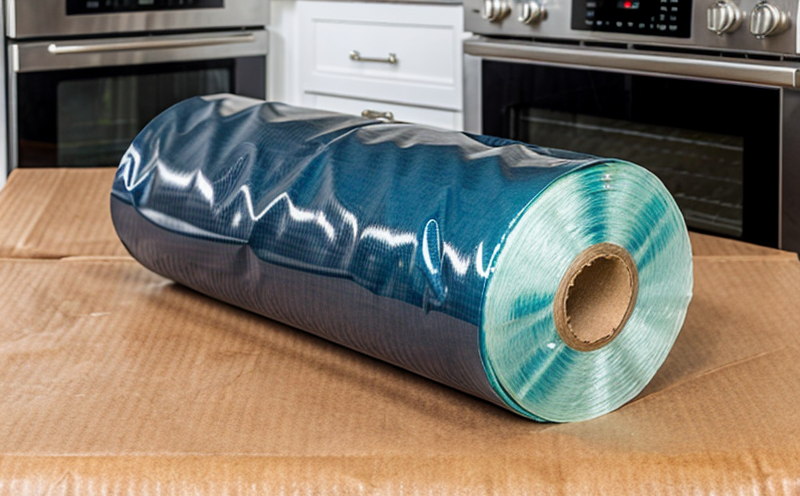Shore A Durometer Hardness Test
The Shore A durometer hardness test is a fundamental method used to measure the indentation hardness of plastics and other materials. This technique provides essential data for understanding the physical properties of household wrap and cover plastics, which are critical in ensuring their performance under various conditions.
The Shore A scale ranges from 0 to 100, with values below 20 indicating very soft materials like rubber or silicone, while values above 80 typically denote hard plastics. For household wraps and covers, the Shore A hardness is a crucial parameter that influences durability, flexibility, and overall product performance.
The testing process involves applying a standard force to a steel indenter with a flat-ended cone tip into the material sample until it penetrates a specified depth. The instrument measures the deflection of this indenter, which corresponds directly to the hardness value on the Shore A scale.
Proper specimen preparation is essential for accurate results. Specimens should be conditioned at standard temperature and humidity levels before testing to ensure consistent readings across multiple samples. Appropriate conditioning helps eliminate errors caused by moisture or temperature variations.
Instruments used in this test include portable durometers, which can provide quick on-site measurements, as well as more sophisticated laboratory equipment capable of recording detailed force-deflection curves. These devices adhere strictly to international standards such as ASTM D2240 and ISO 868, ensuring accurate and reliable hardness values.
Understanding the Shore A durometer hardness of household wraps and covers is vital for several reasons:
- Performance Optimization: By knowing the exact hardness value, manufacturers can optimize their formulations to achieve optimal balance between strength and flexibility.
- Quality Control: Consistent testing ensures that products meet specified quality standards, enhancing consumer satisfaction.
- Regulatory Compliance: Adherence to industry regulations requires precise measurement of material properties like hardness.
The Shore A durometer test is not only a technical procedure but also plays a significant role in the development and manufacturing processes. It allows researchers and engineers to innovate and refine products, contributing significantly to advancements in household wrap technology.
| Industry Applications |
|---|
| The Shore A durometer hardness test finds extensive application across various sectors including packaging, automotive interiors, construction materials, and medical devices. In the context of household wraps and covers, it ensures that these products meet stringent quality standards necessary for effective protection against environmental factors like moisture and UV rays. |
| For instance, in the automotive industry, proper hardness of seat coverings can enhance comfort while maintaining durability. Similarly, in construction, waterproofing membranes require specific Shore A values to function effectively under diverse climatic conditions. |
The test's versatility makes it indispensable for quality assurance teams responsible for ensuring product integrity and reliability. By leveraging the Shore A durometer hardness test, organizations can maintain high standards of manufacturing excellence, ultimately leading to superior products that meet customer expectations.
Industry Applications
The Shore A durometer hardness test is widely used across multiple industries where the flexibility and durability of plastic materials are paramount. Here’s an overview of its applications in specific sectors:
| Sector | Application |
|---|---|
| Packaging & Food Contact Materials | Ensures that packaging films and containers maintain their shape while providing adequate protection against environmental factors. |
| Automotive Interior Components | Guarantees the right balance between comfort, safety, and durability in seat covers, headliners, and other interior components. |
| Construction & Roofing Materials | Verifies that waterproofing membranes have the necessary flexibility to adapt to different roof profiles while maintaining integrity over time. |
| Medical Devices | Ensures that tubing and other components used in medical applications possess the appropriate hardness for safe, effective use. |
In each of these sectors, the Shore A durometer test plays a critical role in maintaining quality standards and ensuring product performance. Its ability to quantify material properties provides valuable insights that drive innovation and improve overall product reliability.
Customer Impact and Satisfaction
The Shore A durometer hardness test significantly impacts customer satisfaction by ensuring the quality, performance, and longevity of household wraps and covers. Here’s how:
- Better Protection: Properly tested products offer enhanced protection against moisture and UV rays, extending their lifespan.
- Enhanced Comfort: In applications like seat covers or bedding, the right hardness level ensures comfort without compromising durability.
- Increased Safety: Medical devices made from appropriately hard materials enhance safety by preventing accidents due to poor grip or deformation.
- Environmental Friendliness: Sustainable products that withstand harsh conditions are more likely to be recycled effectively, reducing waste.
By investing in comprehensive testing services like the Shore A durometer hardness test, manufacturers can meet stringent quality and regulatory requirements. This not only enhances customer trust but also fosters brand loyalty and positive market reputation.
Environmental and Sustainability Contributions
The Shore A durometer hardness test contributes positively to environmental sustainability by promoting the use of materials that are both durable and easily recyclable. Here’s how:
- Material Optimization: By identifying optimal hardness values, manufacturers can reduce waste by minimizing over- or under-hardening processes.
- Recyclability: Testing ensures that the chosen plastics will remain stable during recycling processes, maintaining their integrity and value.
- Eco-Friendly Products: Materials with appropriate hardness are less likely to degrade prematurely, reducing the need for frequent replacements and minimizing landfill contributions.
Through precise testing methods like Shore A durometer hardness measurement, industries can contribute significantly to sustainable practices. This aligns with global efforts towards greener manufacturing processes and more environmentally responsible product lifecycle management.





